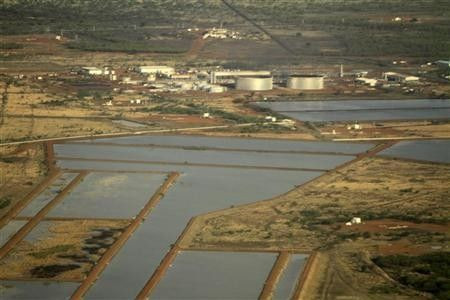S.Sudan eyes new oil export links, may anger north

South Sudan will consider building new pipelines if it finds fresh oil reserves after independence, an official said, a move that could anger Khartoum if the route avoids the north through which exports now flow.
South Sudan is due to secede from the north in July after its voters overwhelmingly chose to declare independence in a referendum last month -- a vote promised in a 2005 peace deal that ended decades of civil war with the north.
Under the terms of the accord, the north currently gets half of the revenues from oil drilled in the south. At present, the landlocked south is entirely dependent on north Sudan's pipelines and port to get its crude to market.
On Tuesday the south's ruling party said it would stop splitting oil revenues after separation but would pay fees to use the north's pipelines, and possibly offer additional grants.
Oil has been the lifeblood of both northern and southern economies, and South Sudan is the source of around 75 percent of the 500,000 barrel per day output.
Any alternative pipelines outside the north could deprive it of revenue just at a time when it is struggling to diversify its economy to make up for the loss of the south.
If there are more oil finds that will justify building new pipelines, then those will be built, the secretary general of the south's ruling Sudan People's Liberation Movement (SPLM) Pagan Amum told reporters on Wednesday, without specifying routes or whether these would avoid the north.
Amum earlier in the week said there were hopes for new oil finds in the southern states of Jonglei, Lakes and Eastern Equatoria. The states include the largely unexplored oil Block B, controlled by a consortium led by France's Total.
Senior northern official Rabie Abdelati dismissed suggestions the move would damage relations.
We think that for the time being, it will be more economical if the existing oil is transported through the north, said Abdelati from the north's dominant National Congress Party.
We are very happy if they discover new reserves of oil in Jonglei because we want a strong south, politically and economically ... If they are thinking of constructing another pipeline for the new oil, it is up to them, he added.
Amum said the landlocked south would also be interested in developing broader transport links to ports in Kenya, Djibouti and the Democratic Republic of Congo.
Southern Sudan is emerging as a landlocked country and it will develop different, alternative routes to access the seas. Southern Sudan will be looking not to be reliant on one single outlet like Port Sudan, he said.
Kenya has already asked investors to fund its $22 billion share of a planned corridor that would connect Ethiopia and South Sudan to the Kenyan coast with railways, roads, telecommunications cables and a 1,400 km pipeline.
Analysts have warned that any new pipelines would be expensive and take years to build, leaving South Sudan dependent on the northern routes for the near future.
© Copyright Thomson Reuters 2024. All rights reserved.





















